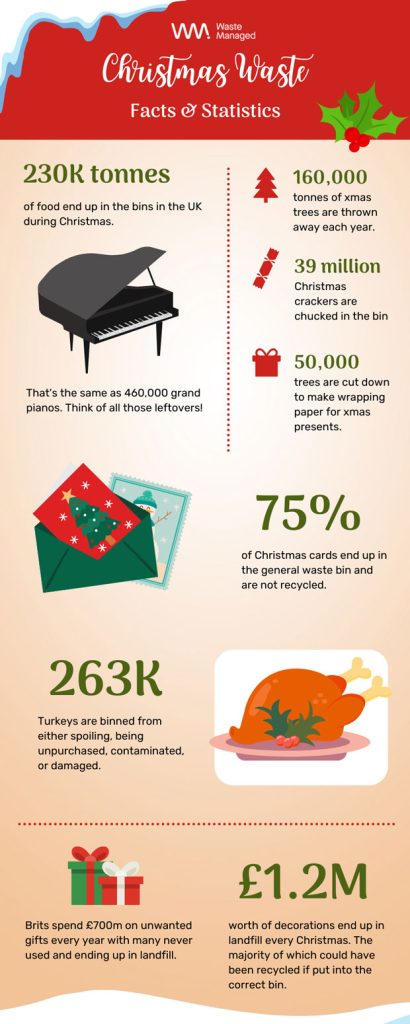As the festive season approaches, Waste Managed, a leading UK waste management company, is shedding light on the alarming environmental impact of Christmas waste.
Data reveals that there is a 30 per cent surge in waste production during the Christmas period.
With many Brits struggling with the cost-of-living crisis and globally facing the challenge of managing the environmental impact of waste – the data reveals the true extent of the waste created during ‘the most wonderful time of the year’.

The Environmental Toll of Christmas Celebrations:
- Christmas Trees: Post-festivities, over 160,000 tonnes of Christmas trees are binned, emitting over 100,000 tonnes of methane gas during decomposition.
- Energy Consumption: The energy required to cook the UK’s Brussels sprouts for Christmas could power a home for 2.5 years.
- Crackers and Cards: Approximately 39 million Christmas crackers and 75% of Christmas cards end up in landfills each year.
- Toy Waste: By spring, almost half (41%) of gifted toys will end up broken and in landfills.
- Glass Bottles: Brits discard 9,500 tonnes of glass beer and wine bottles and 34 million champagne/prosecco bottles each Christmas.
- Wrapping Paper: The discarded wrapping paper during Christmas would stretch to the moon and back – a staggering 238,855 miles.
- Plastic Waste: The plastic waste discarded by Brits during Christmas equals the weight of 76,000 giraffes.
- Food Waste: Around 125,000 tonnes of food packaging and 230,000 tonnes of food end up in landfills during the Christmas holidays.
- Gifts and Decorations: Brits spend £700 million on unwanted gifts, and the average household spends £185 on decorations, leading to £1.2 million worth of decorations in landfills.
- Economic Impact: It costs £26 million to dispose of all the UK’s Christmas waste, with £444 million worth of food wasted each year.
Discussing the impact of Christmas waste and how it can be reduced, Steve Traviss, Sustainability Expert at Waste Managed said: “The festive season is a time of joy and celebration, but it’s essential to recognise the substantial environmental consequences associated with our holiday habits. The increase in waste, particularly during Christmas, is a pressing issue that demands collective attention and action.
“Individuals, families, and businesses need to be mindful of their consumption and disposal habits during the festive period.
“By collectively adopting sustainable practices, we can make a significant positive impact on the environment.”
In addition to the alarming figures, Waste Managed is also sharing tips for a greener Christmas:
- Eco-friendly gifts: Consider sustainable and meaningful gifts to reduce the likelihood of unwanted presents.
- Recycling Christmas cards: Recycle or repurpose Christmas cards to minimise waste.
- Reducing food waste: Plan meals carefully, buy only what’s necessary, and use leftovers creatively.
- Sustainable decorations: Opt for reusable decorations and consider DIY projects using recycled materials.
- Gift wrapping alternatives: Use reusable fabric or eco-friendly wrapping paper to reduce the environmental impact.
- Responsible toy choices: Select durable and sustainable toys, promoting a reduction in broken toy waste.
- Upcycling Christmas trees: Explore local options for recycling Christmas trees into mulch or compost.




